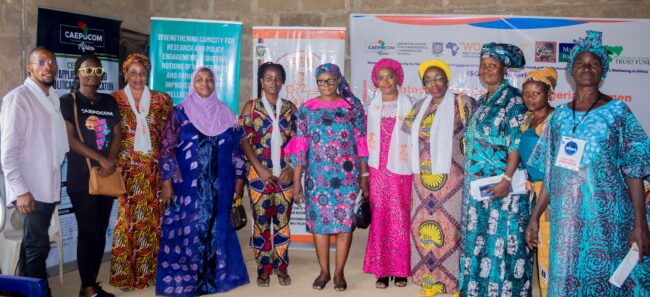Some scholars at the University of Ibadan have urged Ibadan rural women of Ajibade community in Akinyele Local Government Area (LGA) of Oyo State to embrace and leverage digital tools for the betterment of their lives and businesses.
The scholars, on Tuesday, under the auspices of the Women’s Documentation Centre (WORDOC) and the Gender Studies Programme of the Institute of African Studies, University of Ibadan, held a one-day workshop with the theme: ‘Rural families in digital space’ under the project ‘Strengthening the Capacity of Nigerian Women’.
The Coordinator of WORDOC, Dr Sharon Adetutu Omotoso, stated that the annual workshop, which started in 2017, was in commemoration of the 2023 International Day of Rural Women (15 October) with the theme ‘Rural women cultivating good food for All’, and was in partnership the Nigerian Women Trust Fund, The MacArthur Foundation, the Centre for Applied Ethics and Political Communication in Africa (CAEPOCOM Africa).
Omotoso also stated that the workshop was part of collaborative and ongoing research under the umbrella of the Strengthening Capacity for Research and Policy Engagement in Shifting Notions of Motherhood and Fatherhood for Children’s Wellbeing in Africa (SCaRPE-A) project, of which Nigeria is a member alongside four other African countries.
Omotoso stressed that technology and digital spaces – phones, computers, radio, television, internet, and social media, among others − are here to stay and are impossible to ignore, even though they have their advantages and disadvantages.
“Rural people, especially women, need to be aware of these technologies and spread the news so that their families and society will know and be careful of their usage,” Omotoso said.
Dr Mutiat Oladejo of the Department of History, University of Ibadan, noted that the workshop is both research and an outreach endeavor. She started her talk by asking the women how their phones have been useful to them as regards their businesses and families.
Oladejo stated that though rural women need digital literacy and skills, they also need legal, political, social, security, health, and economic empowerment to enable them to know their rights and place in society.
She stressed that these – and more − are some of the things women ought to be conversant with, adding that these are major reasons rural women should have groups within their communities that can question things.
“Women should not be silenced because of their gender. If they do not know the essence of creating virtual platforms and using digital tools, they will not be able to contribute solutions in their communities,” she said.
Dr Adetoun Oyelude of the Kenneth Dike Library, University of Ibadan, and the Executive Director of Women in Unpaid and Informal Employment in Nigeria (WIIEN), Mrs Alaba Ehindero, spoke on the importance of digital tools in promoting local businesses.
They explained how simple tools like phones and social media can help rural people access markets and customers outside their immediate communities, and also how they can reach family members far from them.
Dr Oyelude and Mrs Ehindero elaborated on the dangers of digital tools and the internet which include using them for fraud, cybercrime, bullying, and pornography, amongst others.
Florence Olaleye, the coordinator of rural women in the community, said the workshop was apt in the sense that it was a sensitisation and empowerment gesture that would help the women gain skills that will help their businesses, lives, and community.
Many of the participants at the workshop said they have learned how to leverage their phones to make their lives better and about the danger digital tools pose.
READ ALSO FROM NIGERIAN TRIBUNE






